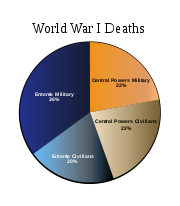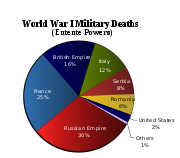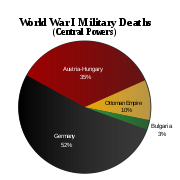
Military attachés and war correspondents in the First World War
Encyclopedia
Military attachés and war correspondents in the First World War were historians creating first-hand accounts of a multi-national, multi-continent, multi-ocean military conflict. In this multi-year series of military engagements across a worldwide landscape of theaters of battle, the military taxonomy
of war became increasingly complex.
The First World War was the first modern mediated war in the sense that warfare becomes conflicts and controversies between parties who exchange information and arguments indirectly by the mass media. The discourse in mediated conflicts is influenced by its public character. By forwarding information and arguments to the media, conflict parties attempt to gain support from their constituencies and persuade their opponents.
 The multi-national military attaché
The multi-national military attaché
s and observers who took part in the First World War were expressly engaged in collecting data and analyzing the interplay between tactics, strategy, and technical advances in weapons and machines of modern warfare. Military theorist Carl von Clausewitz
stressed the significance of grasping the fundamentals of any situation in the "blink of an eye" (coup d'œil
). In a military context, the astute tactician can immediately grasp a range of implications and can begin to anticipate plausible and appropriate courses of action, but World War I resisted the conventional pre-war taxonomies and paradigms.
Military and civilian observers from every major power closely followed the course of the war. Most were able to report on events from a perspective somewhat like what is now termed "embedded
" positions within the land and naval forces of both sides. These military attachés, naval attachés and other observers prepared voluminous first-hand accounts of the war and analytical papers. In-depth observer narratives of the war and more narrowly-focused professional journal articles were written soon after the war; and these post-war reports conclusively illustrated the battlefield destructiveness of this conflict.
The functions of a military attaché are illustrated by the American military attachés in Japan during the war years. A series of military officers had been assigned to the American diplomatic mission in Tokyo since 1901 when the US and Japan were co-operating closely in response to the Boxer Rebellion in China. The military attaché advised the United States Ambassador to Japan
on military matters, acted as a liaison between US Army and the Imperial General Headquarters
, and gathered and disseminated intelligence. The military attaché's office in Tokyo usually had two assistants and a number of "language officers" who were assigned specifically to learn Japanese whilst attached to Japanese Imperial Army regiments as observers. These "language officers" translated training and technical manuals and reported on conditions in Japanese military units.


observers and strict censorship
. This raises the question of the role the media plays in selecting news about such conflicts. Events which support the position of either one of the protagonists in a conflict are understood as instrumental factors in the modern mediated conflict; and the publication of information on these events is construed as one of the major goals of the conflicting parties and one important activity of journalists.
In Britain, there were initially five official accredited war correspondents: Philip Gibbs
, Percival Philips, William Beach Thomas, Henry Perry Robinson, and Herbert Russell
. Their reports were vetted by C. E. Montague. Other writers and journalists who later received official accreditation from the British government were John Buchan, Valentine Williams, Hamilton Fyfe
, Henry Nevinson
and Robert Donald
.
Military taxonomy
Military taxonomy encompasses the domains of weapons, equipment, organizations, strategies, and tactics. The use of taxonomies in the military extends beyond its value as an indexing tool or record-keeping template.-Blink of an eye:...
of war became increasingly complex.
The First World War was the first modern mediated war in the sense that warfare becomes conflicts and controversies between parties who exchange information and arguments indirectly by the mass media. The discourse in mediated conflicts is influenced by its public character. By forwarding information and arguments to the media, conflict parties attempt to gain support from their constituencies and persuade their opponents.
Overview

Military attaché
A military attaché is a military expert who is attached to a diplomatic mission . This post is normally filled by a high-ranking military officer who retains the commission while serving in an embassy...
s and observers who took part in the First World War were expressly engaged in collecting data and analyzing the interplay between tactics, strategy, and technical advances in weapons and machines of modern warfare. Military theorist Carl von Clausewitz
Carl von Clausewitz
Carl Philipp Gottfried von Clausewitz was a Prussian soldier and German military theorist who stressed the moral and political aspects of war...
stressed the significance of grasping the fundamentals of any situation in the "blink of an eye" (coup d'œil
Coup d'œil
Coup d'œil is a term taken from French, that more or less corresponds to the words glimpse or glance in English. The literal meaning is "stroke of [the] eye"....
). In a military context, the astute tactician can immediately grasp a range of implications and can begin to anticipate plausible and appropriate courses of action, but World War I resisted the conventional pre-war taxonomies and paradigms.
Military and civilian observers from every major power closely followed the course of the war. Most were able to report on events from a perspective somewhat like what is now termed "embedded
Embedded journalist
Embedded journalism refers to news reporters being attached to military units involved in armed conflicts. While the term could be applied to many historical interactions between journalists and military personnel, it first came to be used in the media coverage of the 2003 invasion of Iraq...
" positions within the land and naval forces of both sides. These military attachés, naval attachés and other observers prepared voluminous first-hand accounts of the war and analytical papers. In-depth observer narratives of the war and more narrowly-focused professional journal articles were written soon after the war; and these post-war reports conclusively illustrated the battlefield destructiveness of this conflict.
The functions of a military attaché are illustrated by the American military attachés in Japan during the war years. A series of military officers had been assigned to the American diplomatic mission in Tokyo since 1901 when the US and Japan were co-operating closely in response to the Boxer Rebellion in China. The military attaché advised the United States Ambassador to Japan
United States Ambassador to Japan
The United States Ambassador to Japan is the ambassador extraordinary and plenipotentiary from the United States to Japan. Since the opening of Japan by Commodore Matthew C. Perry, in 1854, the U.S. maintained diplomatic relations with Japan, except for the ten-year period following the attack on...
on military matters, acted as a liaison between US Army and the Imperial General Headquarters
Imperial General Headquarters
The as part of the Supreme War Council was established in 1893 to coordinate efforts between the Imperial Japanese Army and Imperial Japanese Navy during wartime...
, and gathered and disseminated intelligence. The military attaché's office in Tokyo usually had two assistants and a number of "language officers" who were assigned specifically to learn Japanese whilst attached to Japanese Imperial Army regiments as observers. These "language officers" translated training and technical manuals and reported on conditions in Japanese military units.
Selected military attachés serving with Entente powers

United States
- Kichisaburo NomuraKichisaburo Nomura-External links:...
, Japan (1914–1918). - Major-General Katsusugu Iouye, Japan (1917–1919); awarded Distinguished Service MedalDistinguished Service Medal (United States)The Distinguished Service Medal is the highest non-valorous military and civilian decoration of the United States military which is issued for exceptionally meritorious service to the government of the United States in either a senior government service position or as a senior officer of the United...
. - Lieutenant Colonel T. Mizumachi, Japan (1917–1919); awarded Distinguished Service MedalDistinguished Service Medal (United States)The Distinguished Service Medal is the highest non-valorous military and civilian decoration of the United States military which is issued for exceptionally meritorious service to the government of the United States in either a senior government service position or as a senior officer of the United...
. - Captain Hsiao Watari, Japan (1917–1919); awarded Distinguished Service MedalDistinguished Service Medal (United States)The Distinguished Service Medal is the highest non-valorous military and civilian decoration of the United States military which is issued for exceptionally meritorious service to the government of the United States in either a senior government service position or as a senior officer of the United...
.
Selected military attachés serving with Central powers

War correspondents
Press coverage of the war was affected by restrictions on the movement of non-combatantNon-combatant
Non-combatant is a term in the law of war describing civilians not taking a direct part in hostilities, as well as persons such as medical personnel and military chaplains who are regular soldiers but are protected because of their function as well as soldiers who are hors de combat ; that is, sick,...
observers and strict censorship
Censorship
thumb|[[Book burning]] following the [[1973 Chilean coup d'état|1973 coup]] that installed the [[Military government of Chile |Pinochet regime]] in Chile...
. This raises the question of the role the media plays in selecting news about such conflicts. Events which support the position of either one of the protagonists in a conflict are understood as instrumental factors in the modern mediated conflict; and the publication of information on these events is construed as one of the major goals of the conflicting parties and one important activity of journalists.
In Britain, there were initially five official accredited war correspondents: Philip Gibbs
Philip Gibbs
Sir Philip Gibbs was an English journalist and novelist who served as one of five official British reporters during the First World War. Two of his siblings were also writers, A...
, Percival Philips, William Beach Thomas, Henry Perry Robinson, and Herbert Russell
Herbert Russell
Herbert Y. Russell was a Canadian ice hockey player who played for the Ottawa Hockey Club in the 1880s and 1890s. He was captain of the team that won three successive Ontario championships and held the Canadian championship in 1892.-Playing career:...
. Their reports were vetted by C. E. Montague. Other writers and journalists who later received official accreditation from the British government were John Buchan, Valentine Williams, Hamilton Fyfe
Hamilton Fyfe
Henry Hamilton Fyfe was a British journalist and writer who served as editor of both the Daily Mirror and the Daily Herald.-Career:...
, Henry Nevinson
Henry Nevinson
Henry Woodd Nevinson was a British campaigning journalist. He was known for his reporting on the Second Boer War, and slavery in Angola in 1904-1905....
and Robert Donald
Robert Donald
Sir Robert Donald was a British newspaper editor.Working as a clerk, Donald submitted free articles to a local journal, then gained employment at the Edinburgh Evening News. He also worked on The Courant and the Northampton Echo before becoming a freelancer. In 1888, he joined The Star, a new...
.
Select list
- Ellis Ashmead-BartlettEllis Ashmead-BartlettEllis Ashmead-Bartlett was a British war correspondent during the First World War. Through his reporting of the Battle of Gallipoli, Ashmead-Bartlett was instrumental in the birth of the Anzac legend which still dominates military history in Australia and New Zealand...
, The TimesThe TimesThe Times is a British daily national newspaper, first published in London in 1785 under the title The Daily Universal Register . The Times and its sister paper The Sunday Times are published by Times Newspapers Limited, a subsidiary since 1981 of News International...
(London) * - Charles BeanCharles BeanCharles Edwin Woodrow Bean , usually identified as C.E.W. Bean, was an Australian schoolmaster, judge's associate, barrister journalist, war correspondent and historian....
, Sydney Morning Herald (New South Wales, Australia). - Richard Harding DavisRichard Harding DavisRichard Harding Davis was a journalist and writer of fiction and drama, known foremost as the first American war correspondent to cover the Spanish-American War, the Second Boer War, and the First World War. His writing greatly assisted the political career of Theodore Roosevelt and he also played...
, Wheeler Syndicate (USA), Daily ChronicleDaily ChronicleThe Daily Chronicle was a British newspaper that was published from 1872 to 1930 when it merged with the Daily News to become the News Chronicle.-History:...
(London) - Granville Roland FortescueGranville Roland FortescueGranville Roland Fortescue was an American soldier, a Rough Rider serving with his cousin, Colonel Theodore Roosevelt in Cuba, a presidential aide in the first Roosevelt administration and later, a journalist and war correspondent for the London Standard during the Rif War in 1920 Spanish Morocco...
, Daily Telegraph (London) - Hamilton FyfeHamilton FyfeHenry Hamilton Fyfe was a British journalist and writer who served as editor of both the Daily Mirror and the Daily Herald.-Career:...
, Daily MailDaily MailThe Daily Mail is a British daily middle-market tabloid newspaper owned by the Daily Mail and General Trust. First published in 1896 by Lord Northcliffe, it is the United Kingdom's second biggest-selling daily newspaper after The Sun. Its sister paper The Mail on Sunday was launched in 1982...
(London). - Floyd GibbonsFloyd GibbonsFloyd Phillips Gibbons was the war correspondent for the Chicago Tribune during World War I. One of radio's first news reporter and commentators he was famous for a fast talking delivery style. Floyd Gibbons lived a life of danger of which he often wrote and spoke.Gibbons started with the Tribune...
, Chicago TribuneChicago TribuneThe Chicago Tribune is a major daily newspaper based in Chicago, Illinois, and the flagship publication of the Tribune Company. Formerly self-styled as the "World's Greatest Newspaper" , it remains the most read daily newspaper of the Chicago metropolitan area and the Great Lakes region and is... - Philip GibbsPhilip GibbsSir Philip Gibbs was an English journalist and novelist who served as one of five official British reporters during the First World War. Two of his siblings were also writers, A...
, The War IllustratedThe War IllustratedThe War Illustrated was a British war magazine published in London by William Berry . It was first released on 22 August 1914, eighteen days after the United Kingdom declared war on Germany, and regular issues continued throughout World War I...
(London); Daily ChronicleDaily ChronicleThe Daily Chronicle was a British newspaper that was published from 1872 to 1930 when it merged with the Daily News to become the News Chronicle.-History:...
(London). - Louis GrondijsLouis GrondijsLodewijk Hermen Grondijs was a Dutch war correspondent and byzantinist.Grondijs was born in the Dutch East-Indies, now known as Indonesia, and via his mother was one eighth Indonesian. He spent most of his youth in the East Indies and graduated in 1896 from grammar school in Surabaya...
, Nieuwe Rotterdamsche CourantNieuwe Rotterdamsche CourantThe Nieuwe Rotterdamsche Courant was an influential Rotterdam-based liberal daily newspaper, founded in 1844 by Henricus Nijgh.It merged in 1970 with the Amsterdam-based liberal daily newspaper Algemeen Handelsblad to form the NRC Handelsblad....
(Rottterdam); L'IllustrationL'IllustrationL'Illustration was a weekly French newspaper published in Paris. It was founded by Edouard Charton; the first issue was published on March 4, 1843....
(Paris); Daily Telegraph. - Will Irvin, Collier's
- F. Tennyson Jesse, Collier's
- Robert Scotland LiddellRobert Scotland LiddellRobert Scotland Liddell was a British reporter and photographer for The Sphere newspaper, who covered the events on the Russian front during the World War I.- Books :...
, The SphereThe Sphere (newspaper)The Sphere was a British newspaper, published weekly from 27 January 1900 until the closure of the paper on 27 June 1964; the first issue came out at the height of the Boer War and was no doubt a product of that conflict and the public appetite for images...
. - Gerald Morgan Collier's
- Keith MurdochKeith MurdochSir Keith Arthur Murdoch was an Australian journalist and the father of Rupert Murdoch, the CEO and Chairman of News Corp.-Life and career:Murdoch was born in Melbourne in 1885, the son of Annie and the Rev...
Melbourne Herald & Sydney Sun (Australia) - E. Alexander PowellE. Alexander PowellE. Alexander Powell was an American war correspondent during World War I and author. He generally published material under the name E. Alexander Powell; his full name was Edward Alexander Powell....
, New York WorldNew York WorldThe New York World was a newspaper published in New York City from 1860 until 1931. The paper played a major role in the history of American newspapers...
; 'Scribner's; Daily Mail. - Mary Roberts RinehartMary Roberts RinehartMary Roberts Rinehart was an American writer, often called the American Agatha Christie. She is considered the source of the phrase "The butler did it", although she did not actually use the phrase. She is considered to have invented the "Had-I-But-Known" school of mystery writing...
, The Saturday Evening PostThe Saturday Evening PostThe Saturday Evening Post is a bimonthly American magazine. It was published weekly under this title from 1897 until 1969, and quarterly and then bimonthly from 1971.-History:...
. - Charles à Court RepingtonCharles à Court RepingtonLieutenant Colonel Charles à Court Repington , CMG, was a British Army officer and war correspondent.-Biography:Charles Repington was born at Heytesbury, Wiltshire in 1858, where his father was a Conservative Party Member of Parliament...
, The Times. - William Beach Thomas, Daily Mail.
- Frederick Villiers, Illustrated London NewsIllustrated London NewsThe Illustrated London News was the world's first illustrated weekly newspaper; the first issue appeared on Saturday 14 May 1842. It was published weekly until 1971 and then increasingly less frequently until publication ceased in 2003.-History:...
. - Alice Waterman.
See also
- Military attachés and observers in the Russo-Japanese WarMilitary attachés and observers in the Russo-Japanese WarMilitary attachés and observers in the Russo-Japanese War were historians creating first-hand accounts of what was arguably the world's first modern war...
- United Nations Military Observer
- List of participants to Paris Peace Conference, 1919

